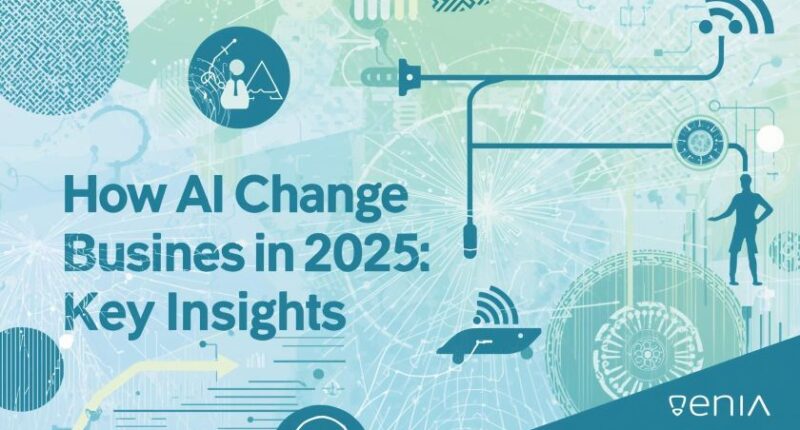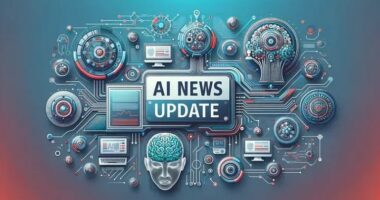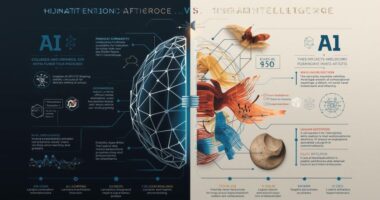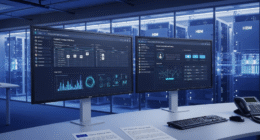Artificial Intelligence (AI) is no longer a futuristic idea—it’s a business reality. In 2025, AI will continue to disrupt industries, redefine workflows, and open new opportunities for growth. From customer service chatbots to predictive analytics and generative AI tools, businesses are increasingly leveraging AI to gain a competitive edge.
This article explores how AI will change business in 2025, highlighting key insights that executives, entrepreneurs, and professionals need to know.
Why AI Is Transforming Business in 2025
AI has matured from being a niche technology to a mainstream driver of digital transformation. The global AI market is projected to exceed $500 billion by 2025, with companies investing heavily in automation, data-driven decision-making, and personalized customer experiences.
Key reasons why AI is reshaping business include:
-
Cost Efficiency – Automating repetitive tasks saves time and money.
-
Smarter Decision-Making – Data-driven insights enhance strategy.
-
Customer Expectations – Consumers demand faster, more personalized services.
-
Innovation at Scale – AI enables new business models and markets.
Key Areas Where AI Will Change Business in 2025
1. Customer Experience and Personalization
AI will redefine how businesses interact with customers. Using predictive analytics and machine learning, companies can offer hyper-personalized services.
Examples include:
-
Chatbots providing 24/7 support
-
Recommendation engines suggesting products based on browsing history
-
AI-powered CRM systems predicting customer needs
By 2025, AI-driven personalization will become a standard expectation rather than a competitive advantage.
2. Marketing and Sales Transformation
AI is already revolutionizing marketing by optimizing campaigns, analyzing customer behavior, and automating ad targeting. In 2025, businesses can expect:
-
Generative AI tools creating ad copy, social posts, and video content
-
AI-driven analytics identifying the most profitable customer segments
-
Sales forecasting models helping businesses allocate resources effectively
This shift will allow businesses to reach customers faster and more efficiently.
3. Smarter Business Operations
AI-powered automation will transform operations by streamlining supply chains, logistics, and workflows. By 2025, we’ll see:
-
Robotic Process Automation (RPA) eliminating repetitive back-office tasks
-
AI-driven logistics optimizing delivery routes in real-time
-
Predictive maintenance reducing equipment downtime
These innovations will increase efficiency while reducing costs, making businesses more agile.
4. Finance and Risk Management
In finance, AI will continue to play a key role in fraud detection, risk management, and investment strategy. Businesses will benefit from:
-
AI-based fraud detection systems monitoring transactions in real-time
-
Automated financial analysis improving decision-making
-
Smart contracts and blockchain integration ensuring secure, transparent transactions
By 2025, AI will become a cornerstone of financial operations across industries.
5. Human Resources and Talent Management
Hiring, training, and managing employees will change drastically in 2025. AI in HR will focus on:
-
AI-driven recruitment tools screening resumes and predicting candidate success
-
Employee performance analysis powered by machine learning
-
Personalized learning platforms offering adaptive training
This ensures businesses attract, retain, and develop top talent effectively.
6. Product Innovation and R&D
AI will accelerate innovation by simulating prototypes, predicting market demand, and speeding up research. Examples include:
-
AI in pharmaceuticals reducing drug discovery timelines
-
AI-powered design tools generating new product concepts
-
Market simulations helping businesses test product viability
Companies that embrace AI-driven innovation will stay ahead of the competition.
7. Cybersecurity and Data Protection
As businesses rely more on AI, cyber threats are becoming more sophisticated. In 2025, AI will enhance cybersecurity through:
-
Real-time threat detection powered by machine learning
-
AI-driven identity protection securing customer data
-
Automated response systems neutralizing threats instantly
Strong AI-driven security will be crucial for maintaining trust and compliance.
Challenges Businesses Will Face with AI in 2025
While AI offers significant benefits, businesses must also navigate challenges:
-
Ethical Concerns – AI bias, privacy issues, and fairness in decision-making.
-
Cost of Implementation – Advanced AI tools require investment in infrastructure.
-
Workforce Disruption – Employees need reskilling to adapt to AI-driven workplaces.
-
Regulatory Compliance – Governments are introducing stricter AI regulations.
Addressing these challenges responsibly will separate leaders from laggards.
The Future of Business Leadership with AI
In 2025, successful business leaders will not just adopt AI but embed it into their organizational culture. Leaders will:
-
Promote AI-first strategies across departments.
-
Invest in ethical AI practices to ensure fairness and compliance.
-
Encourage cross-functional collaboration between tech teams and business units.
-
Focus on reskilling the workforce to thrive alongside AI.
Key Insights for Businesses in 2025
-
AI will be mainstream across all industries – not just tech.
-
Customer personalization will drive loyalty and revenue.
-
AI-powered automation will redefine efficiency.
-
Ethical AI practices will become a business necessity.
-
Innovation through AI will create new products, services, and markets.
Conclusion
The question is no longer whether AI will change business—it’s how fast and how deeply it will transform operations, industries, and customer expectations. In 2025, businesses that embrace AI with clear strategies, responsible practices, and a focus on human-AI collaboration will lead the way.
From customer experience and operations to finance, HR, and cybersecurity, AI is becoming the backbone of modern business. By preparing today, leaders can harness AI not only to survive but to thrive in the digital future.









